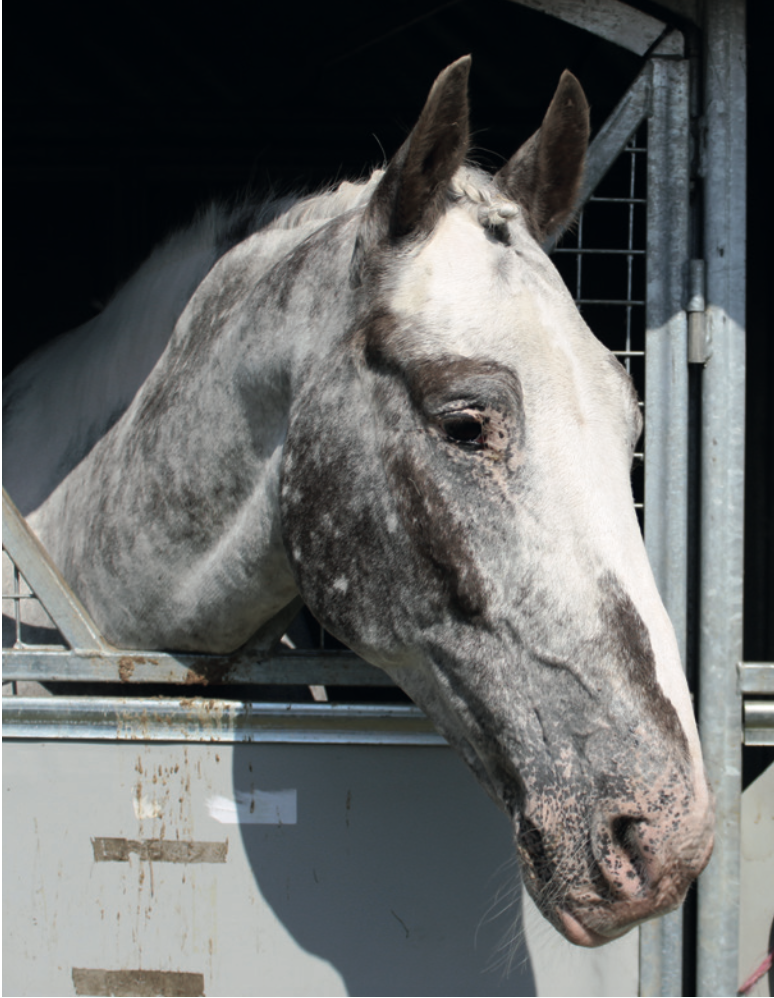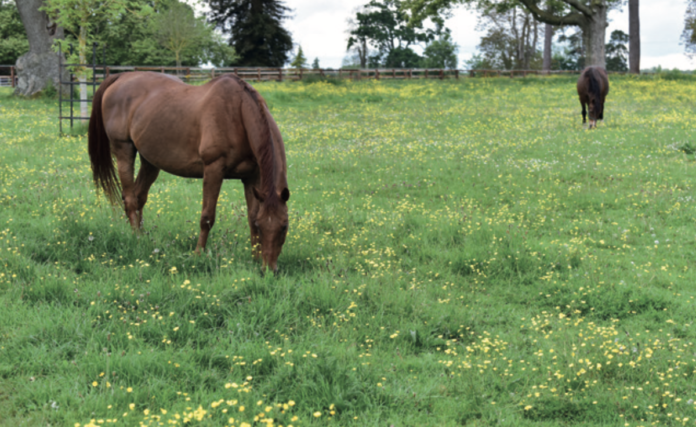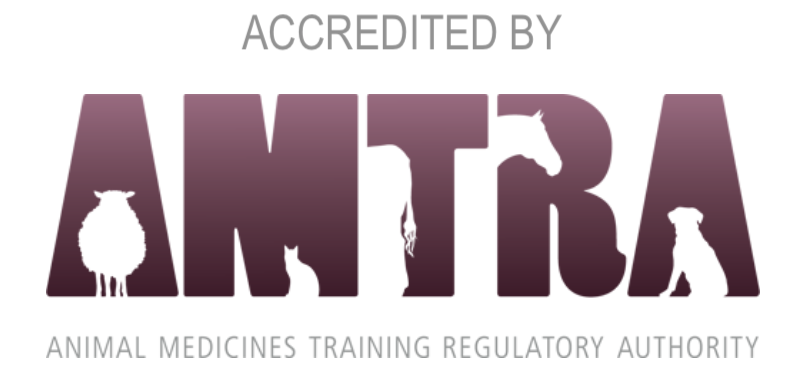CARE OF THE VETERAN HORSE
By Kate Hore RNutr(Animal), senior nutritionist at NAF
All RAMAs/SQPs must earn a certain number of CPD points in a given period of time in order to retain their qualification. RAMAs/SQPs who read this feature and submit correct answers to the questions below will receive two CPD points.
It is widely accepted that the equine population is ageing in the UK and globally.
Improvements in availability of routine anthelmintics, better nutrition knowledge and, of course, the fact that horse owners increasingly see their horses as members of the family have all contributed.
Surveys find around 30% of the UK equine population are ‘veterans’, but what is a veteran and how can we advise owners in their changing care requirements?
Though there is no fixed definition, horses are generally classed as being ‘veterans’ from 15 years and above. This is around the age where we see products, including feed and insurance packages, specifically marketed for older horses, where veteran showing classes start, and where prospective purchasers are likely to see age as a negative.
However, research shows owners themselves don’t really see their horses as ‘old’ until around 22 years of age. Certainly, many horses continue to enjoy good health, condition and exercise well into their twenties, so how can we advise owners in maintaining health in their older equines?
Did you know? Old Billy was the oldest horse ever recorded; he was a working barge horse and died in 1822 aged an amazing 62 years.
IMMUNE FUNCTION
Reduced immune function is recognised in many species as they age, with changes in both the general defences, or ‘innate immunity’, and the acquired response, also known as ‘adaptive immunity’, to specific antigens.
This decreased efficiency of the immune system, known as immunosenescence, is also seen in horses, resulting in an increased risk of age-related conditions. Factors influencing the change are complex, but thought to include oxidative stress by Reactive Oxygen Species (ROS) – damaging free radical molecules that cause damage to DNA, RNA and proteins, and may cause cell death.
Increasingly we recognise the link between digestive health and immunity. Indeed, the Gut Associated Lymphoid Tissue, or GALT, is recognised as providing over 70% of total immunity. Therefore, it is imperative we support digestive health in older horses to help their immunity.

Researchers advise that we can best support the GALT by feeding a high fibre, low starch diet. Taking it one step further, the more we can introduce a complexity of fibres into that diet, and not just feed a monoculture, i.e. just grass, then we can support both the Richness (number of species) and Evenness (distribution of species) of the microbial system, which results in increasing the Diversity of the microbiome.
One of the reasons we are all advised to eat five helpings of fruit and vegetables a day is not just for their natural antioxidant content, but also for their complex fibrous content. Therefore advising a daily supplement of natural plant derived antioxidants will support not only the antioxidant defences, important against ROS, but also increase the variety of fibres of the diet, and so digestive health.
To further support the health of the natural microbiome, it is advised to supplement with targeted gut support, such as prebiotics and live probiotic yeast as a digestibility enhancer, which can aid fibre digestion. Providing daily gut support is particularly important for older horses as colic and gastrointestinal diseases are one of the most common conditions seen both chronically in older horses, and as a cause of mortality in veterans.
When advising probiotics for horses, remember to look for ‘Saccharomyces cerevisiae’, the only legal probiotic for horses in the EU. The listing will be under Additives on the label, together with the inclusion rate, declared as ‘cfu’ (colony forming units).
LONG IN THE TOOTH
It’s well known that horse’s teeth change over time; they continually erupt through most of their life, and change in response to age, diet and management. Horses are born with a finite amount of tooth, so later in
life they may become worn, resulting in the increased dental disease commonly seen in older horses.
Signs of dental disease include ‘quidding’ (dropping food), bad breath or discharge from the nostrils. Owners should speak to their vet if they see any of these signs, and, in any case, ensure the teeth of all horses are checked at least annually.
MAINTAINING SOUNDNESS
Musculoskeletal conditions, particularly lameness and osteoarthritis, are consistently found to be the biggest concern in older horses. It is thought that horses, like humans, show evidence of ‘inflammageing’, that is, a raised pro- inflammatory state within their body, meaning aches and pains are far more likely.
As obesity also increases circulating inflammatory cytokines, this is a principle reason why all horses, including older horses, should be kept ‘fit not fat.’
To maintain joint health in older horses, it is recommended to feed a good quality joint supplement. With the huge choice available it can be difficult to know which to advise, but discussing your customer’s requirements can help hugely.
Firstly, establish the general health of the horse and their level of work. For horses still active and competing it will be important the product is BETA NOPS accredited, for competition suitability, and contains a synergistic blend of the key joint support nutrients, including glucosamine and MSM. For older horses, it is particularly advised that the supplement also includes omega 3 fatty acids and natural antioxidants, both indicated through the ageing process.
However, for horses further along the process it may be that maintaining comfort, while retired or in light work, is of primary importance. If this is the case, herbal support from botanicals such as Devils Claw or Turmeric can be very useful. However, remember the anti-inflammatory action of harpagoside, the active phytochemical in Devils Claw, is so well recognised that it is classed as a Controlled Medication under FEI rules, and so should not be advised for competing horses.
Whether supporting active joints, or maintaining comfort in geriatrics, choose products you can trust; look for quality audits such as GMP+, and a name you trust to provide evidence based nutritional answers to the complex question of ageing in horses.
Regular turnout should also be advised, while gentle exercise can be very useful. Prolonged periods of stabling are not advised, as they may further increase joint stress in older horses. However, ensure veteran horses are protected from extremes of weather, with shelter and rugging where appropriate, as the horse’s ability to thermoregulate reduces as age advances.
NEXT MONTH
Reduced immunity, digestive function and increase in joint stress are some of the key issues associated with ageing in equines, but they are not the only ones. Part 2 of this CDP feature will cover other common age-related conditions in horses, including endocrine disease, respiratory stress and ocular conditions.
Selected references
- Geor R.J, Harris P.A & Coenen M (2013) Equine Applied and Clinical Nutrition. Pub: Saunders Elsevier.
- Horohov D. W, Adams A.A & Chambers T.M (2009) Immunosenescence of the Equine Immune System. Journal of Comparative Pathology. Jan 142; Supp 1 578-84
- Nicholls V.M & Townsend N (2016) Dental Disease in Aged Horses and Its Management. Vet Clin North Am Equine Practice. Aug 32: 215-27
ETN’s series of CPD features helps RAMAs (Registered Animal Medicines Advisors/SQPs) earn the CPD (continuing professional development) points they need. The features are accredited by AMTRA, and highlight some of the most important subject areas for RAMAs/SQPs specialising in equine and companion animal medicine.
AMTRA is required by the Veterinary Medicines Regulations to ensure its RAMAs/SQPs undertake CPD. All RAMAs/SQPs must earn a certain number of CPD points in a given period of time in order to retain their qualification. RAMAs/SQPs who read this feature and submit correct answers to the questions below will receive two CPD points. For more about AMTRA and becoming a RAMA/SQP, visit www.amtra.org.uk












